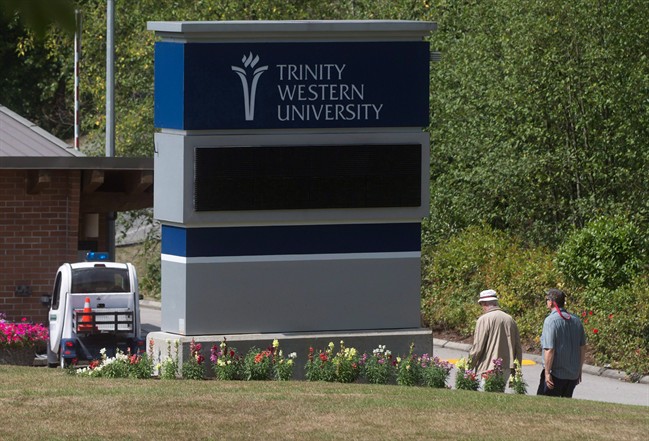TORONTO — Ontario’s top court has dismissed an appeal from a private Christian university that forbids sexual intimacy outside heterosexual marriage, denying its proposed law school accreditation in the province.

The ruling from the Ontario Court of Appeal on Wednesday dealt a significant blow to Trinity Western University in a legal battle which pitted freedom of religion against equality rights.
A panel of three appeal court judges found that while the university’s religious freedom had been infringed upon, the institution discriminated against the LGBTQ community.
READ MORE: B.C. Christian university takes law school fight to Ontario top court
Trinity Western – which is fighting similar cases at appeal courts in Nova Scotia and British Columbia – expressed disappointment at the ruling, saying it would be taking its fight to the Supreme Court of Canada.
The Ontario case saw the Evangelical Christian institution based in Langley, B.C., go up against the Law Society of Upper Canada after the regulatory body voted not to accredit the university’s planned law facility.
At the heart of the dispute was Trinity Western’s “community covenant” or code of conduct, which all students are required to agree to.
READ MORE: Appeal of ruling on law grads from Trinity Western begins in Halifax
It includes requiring students to abstain from gossip, obscene language, prejudice, harassment, lying, cheating, stealing, pornography, drunkenness and sexual intimacy “that violates the sacredness of marriage between a man and a woman.”

Get daily National news
“The part of TWU’s Community Covenant in issue in this appeal is deeply discriminatory to the LGBTQ community, and it hurts,” the appeal court ruling said. “The LSUC’s decision not to accredit TWU was indeed a reasonable conclusion.”
The appeal court also noted that while the university might find it more difficult to operate a law school without accreditation in Ontario, it wasn’t prevented from running the facility in accordance with its beliefs.
READ MORE: B.C. law society appeals Trinity Western decision
“The LSUC’s decision not to accredit TWU does not prevent the practice of a religious belief itself; rather it denies a public benefit because of the impact of that religious belief on others – members of the LGBTQ community.”
The law society said it was pleased the court recognized its role “in preventing and removing discriminatory barriers to access to the legal profession” while trying to promote a diverse profession.
Trinity Western, however, warned that the court’s decision sets “a very scary precedent.”
“It’s saying that a public organization like the law society has the freedom to say ‘this is what you may believe. Your freedom of religion is not that important,”‘ spokeswoman Amy Robertson said in an interview.
“Freedom of conscience and religion is one of the most profound privileges of being a Canadian – it gives us the right to believe in God and express that and it gives us the right not to believe in God and express that.”
READ MORE: B.C. Supreme court rules in favour of Christian university
The university also noted that it was not making a statement about LGBTQ people, but instead was making a statement about “Biblical” marriage.
The Law Society of Upper Canada had voted in April 2014 not to accredit the university’s proposed law school, citing its controversial covenant as discriminatory. The university applied for judicial review of the decision but was dismissed by a lower Ontario court, paving the way for the case before the appeal court.
The university has repeatedly noted that it does not ban admission to gay, lesbian, bisexual or transgender students or faculty, and has said its community offers “an environment in which sexual minorities are supported, loved and respected.”
It had argued that the Ontario law society’s decision infringed not only on freedom of religion rights, but also on freedom of expression, freedom of association and equality rights.
The Law Society of Upper Canada, however, found Trinity Western’s covenant highly problematic.
It had argued that accrediting the university’s law school would violate the law society’s core commitment to equality and would discriminate against individuals based on sexual orientation, gender, marital status and religion.







Comments